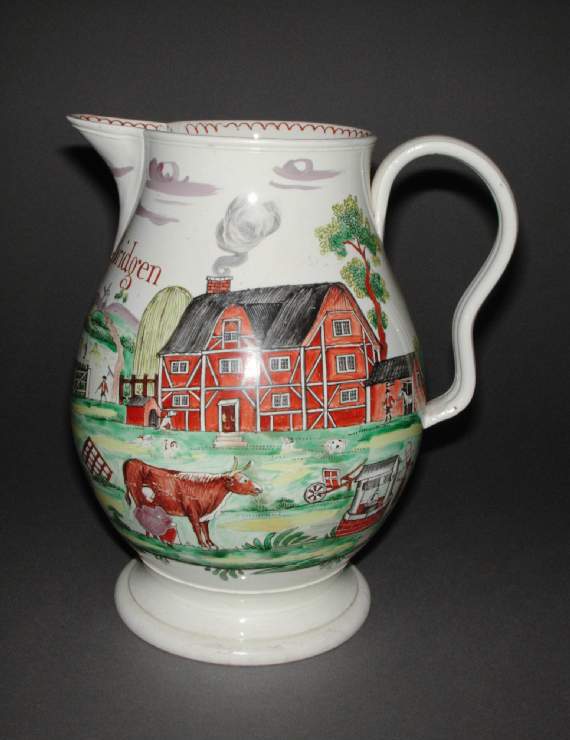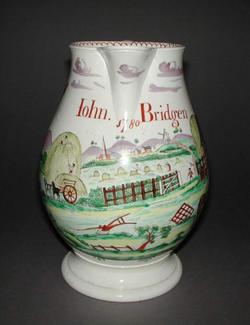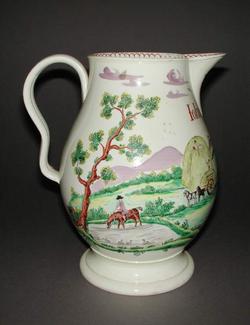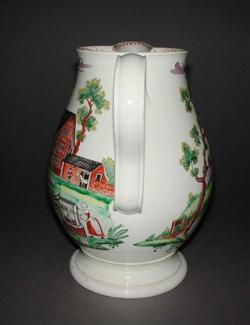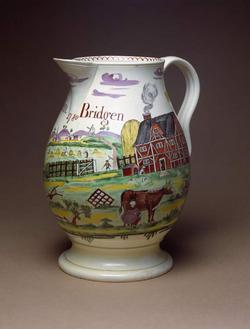Current Location: Gallery 12 (Adeane)
Maker(s)
Production:
Unidentified Yorkshire factory
(Possibly)
Production:
Unidentified Staffordshire factory
(Possibly)
Entities
Categories
Description
Creamware painted in polychrome enamels with a continuous rural scene and the name and date 'Iohn Bridgen/1780
Creamware, thrown, lead-glazed, and painted in green, yellow, red, brown, pale purple, and black enamels. The jug has a bulbous pear-shaped body standing on a outward-curving foot. It has a pointed lip and an ear-shaped strap handle with a vertical groove on each side of its outer edge. The body is decorated with a continuous rural scene. On the extreme right, a woman draws up a bucket from a well. A wheelbarrow stands beside it. Behind her a man leads a horse out of a stable adjacent to a large timber-framed farmhouse with a thatched roof and smoking chimney. On its left, a seated dog is chained to his kennel, and there is another dog behind the wheelbarrow. Two hens are near the first dog and one near the second. In the foreground a dairymaid is milking a red cow, and further to the left is a harrow and a plough, part of a fence and a low tree. Further back, on the left of the house, there is a haystack and a man holding a rake and walking towards an open gate in a fence. Behind it is a field in which a man and a woman are raking and staking hay into heaps. In the distance behind them is a windmill, two houses, and a church against a ridge of hills with small trees on their summits. To the left of the hayfield a man stands on a heap of hay in a cart drawn by two horses, and forks hay up to another man on the top of a large hayrick. Beyond him to the left there are fields, hedges and hills. In the left foreground there is a man on horseback allowing his horse to drink from a duck pond with a tree and part of a fence beside it. Inside the neck there is a red scalloped line.
Notes
History note: Mr Stewart Acton, 12 Prince Albert Street, Brighton, from whom purchased for £7.10s. on 15 October 1921 by Dr J.W.L. Glaisher, FRS, Trinity College, Cambridge
Legal notes
Dr J. W. L. Glaisher Bequest
Measurements and weight
Height: 24.2 cm
Width: 21.2 cm
Acquisition and important dates
Method of acquisition: Bequeathed
(1928-12-07)
by
Glaisher, J. W. L., Dr
Dating
18th Century, Late
George III
Production date:
dated
AD 1780
Note
If made in Yorkshire this jug may have come from the Swinton factory, or from Leeds Potttery which opened in 1780. It might also have been made in north Staffordshire.
Label text from the exhibition ‘Feast and Fast: The Art of Food in Europe, 1500–1800’, on display at The Fitzwilliam Museum from 26 November 2019 until 31 August 2020: Demand for dairy produce increased in eighteenth-century Britain. Ensuring that dairy herds had food during the Winter was critical, so haymaking became an important annual event. This explains its inclusion on John Bridgen’s milk jug, even if by 1780, cows were also being fed with grasses, turnips, and cabbages to guarantee a more consistent, year-round yield. Skilled dairymaids were vital to meeting the demand, milking their cows twice daily, normally at sunrise and before sundown. Another essential task was preparing and storing unweaned calves’ stomachs to provide rennet for curd and cheese production.
Components of the work
Decoration
composed of
enamel
( green, yellow, red, brown, pale purple, and black)
Foot
Diameter 13.2 cm
Body
Lip And Handle
Materials used in production
cream
Earthenware
Lead-glaze
Techniques used in production
Lead-glazing
Inscription or legends present
- Text: Iohn. Bridgen/1780
- Location: On front under lip
- Method of creation: Painted in red
- Type: Inscription
Inscription present: rectangular white paper stick-on label with a blue line border on three sides
- Text: No 3789/Large Leeds ware/jug with farm/yard scene in/bright colours/and inscribed/Iohn Bridgen/1780/b. in Brighton/Oct 15 1921
- Location: On base
- Method of creation: Hand-written in black
- Type: Label
References and bibliographic entries
Related exhibitions
Identification numbers
Accession number: C.1055-1928
Primary reference Number: 71240
3789: old object number
Stable URI
Audit data
Created: Saturday 6 August 2011
Updated: Friday 1 August 2025
Last processed: Friday 1 August 2025
Associated departments & institutions
Owner or interested party:
The Fitzwilliam Museum
Associated department:
Applied Arts
